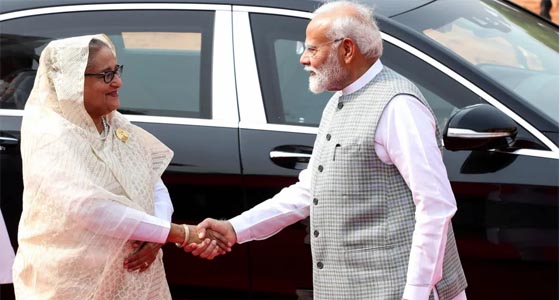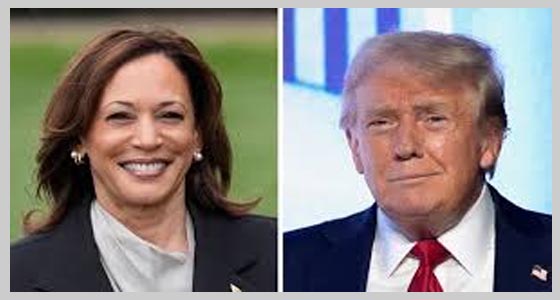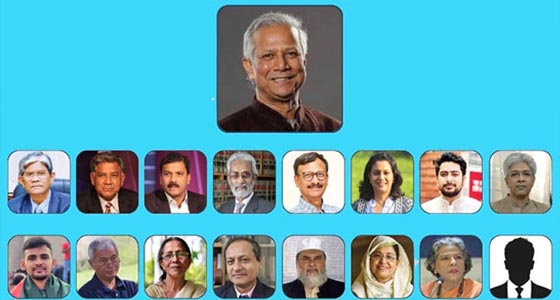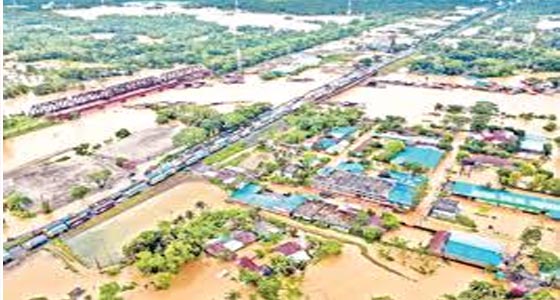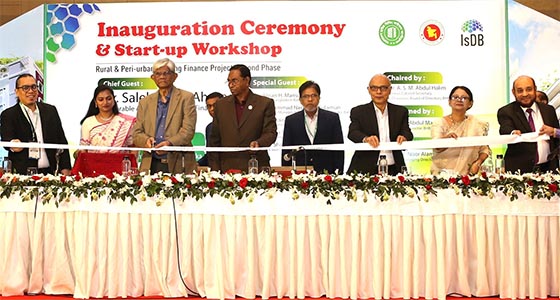India’s Bangladesh dilemma: What to do about Sheikh Hasina?
- Last Update : 01:00:17 pm, Tuesday, 3 September 2024
- / 770 Read Count
Anbarasan Ethirajan and Vikas Pandey
It’s been nearly a month since former Bangladesh prime minister Sheikh Hasina hurriedly landed at a military base near Delhi after a chaotic exit from her country. Ms Hasina’s dramatic ouster on 5 August followed weeks of student-led protests which spiralled into deadly, nationwide unrest. She was initially expected to stay in India for just a short period, but reports say her attempts to seek asylum in the UK, the US and the UAE have not been successful so far.
Her continued presence in India has generated challenges for Delhi in developing a strong relationship with the new interim government in Dhaka. For India, Bangladesh is not just any neighbouring country. It’s a strategic partner and a close ally crucial to India’s border security, particularly in the north-eastern states.
The two countries share a porous border 4,096km (2,545 miles) long which makes it relatively easy for armed insurgent groups from India’s north-eastern states to cross into Bangladesh for a safe haven. Sheikh Hasina: The pro-democracy icon who became an autocrat After Ms Hasina’s Awami League party came to power in 2009, it cracked down on some of these ethnic militant groups. Ms Hasina also amicably settled several border disputes with India.
While border security is at the core of the relationship, there are financial aspects too. During Ms Hasina’s 15-year rule, trade relations and connectivity between the two countries flourished. India has gained road, river and train access via Bangladesh to transport goods to its north-eastern states.
Since 2010, India has also given more than $7bn (£5.3bn) as a line of credit to Bangladesh for infrastructure and development projects.
Ms Hasina’s sudden exit means that Delhi has to work hard to ensure that these gains are not lost. “It’s a setback in the sense that any turbulence in our neighbourhood is always unwanted,” says Pinak Ranjan Chakravarty, a former Indian High Commissioner in Dhaka.
But the former diplomat insists that Delhi will work with the interim government in Dhaka because “there is no choice” and “you can’t dictate what they do internally”.
The Indian government has wasted no time in reaching out to the interim government in Dhaka, with Prime Minister Narendra Modi holding a telephone conversation with leader Muhammad Yunus.
However, it will take a while for Delhi to assuage the anger in Bangladesh over its unwavering support for Ms Hasina and her Awami League for the last 15 years.
Many Bangladeshis attribute the anger against India to Delhi’s swift endorsement of three controversial elections won by Ms Hasina’s party amid allegations of widespread vote-rigging.
With Ms Hasina’s fall, Delhi’s “neighbourhood first” policy has taken another jolt with Bangladesh joining the Maldives and Nepal in resisting any attempt at dominance by India.
Analysts say that Delhi can’t afford to lose its influence in another neighbouring country if it wants to protect its status as a regional powerhouse – especially as rival China is also jostling for influence in the region.
Just last year, Mohamed Muizzu won the presidency in the Maldives on the back of his very public anti-India stand.
“It’s time for India to do some introspection regarding its regional policy,” says Debapriya Bhattacharya, a senior economist with the Centre for Policy Dialogue in Dhaka.
Delhi needs to look at whether it has adequately taken on board the perspectives of its regional partners, he says.
“I am not only talking about Bangladesh, [but also] almost all other countries in the region,” adds Mr Bhattacharya, who heads a committee appointed by the interim government to prepare a white paper on the state of Bangladesh’s economy.
Can India help its special ally Bangladesh defuse the crisis?
For example, in the case of Bangladesh, analysts point out that successive Indian governments have failed to engage with other opposition parties, particularly the Bangladesh Nationalist Party (BNP).
“India somehow thought that the Awami League and its government are the only allies inside Bangladesh. That was a strategic blunder,” says Abdul Moyeen Khan, a senior leader of the BNP.
If free and fair elections are held in Bangladesh in the coming months, BNP leaders are confident of victory.
That will pose a diplomatic challenge for Delhi. There is a perceived trust deficit between India and the BNP, which is led by Begum Khaleda Zia, who had been prime minister for two terms earlier.
Ms Zia, who spent most of her time in jail since 2018, has always denied corruption charges against her and has accused Ms Hasina of political vendetta. She has now been released from jail and is recovering from her illness.
In the coming days, Delhi and the BNP leaders will have to find a way to work past their differences.
During the previous BNP-led coalition government from 2001 to 2006, the bilateral relationship deteriorated with Delhi accusing Dhaka of harbouring insurgents from India’s north-east.
During Ms Zia’s rule, Hindu leaders in Bangladesh said there were a series of attacks against them – including murder, looting and rape – by Islamist parties and the BNP which began as the election results were announced in 2001.
The BNP denies the charges of giving shelter to anti-Indian insurgents and also of carrying out attacks on minority Hindus in 2001.
BNP leaders, including Mr Khan, say India hasn’t been forthcoming in engaging with them, adding that “now it’s time for a policy shift on the part of Delhi”.
He also stresses that given India’s proximity, population, geographical size and its growing economic and military might, a party like the BNP cannot afford to make the mistake of harbouring any anti-Indian insurgents within Bangladesh.
‘There is no law and order. And Hindus are being targeted again’
There are other factors also behind the anger against India. India and Bangladesh share 54 rivers and the sharing of water resources is a contentious issue.
The recent floods triggered by heavy rains in eastern Bangladesh are an example of how misinformation can fuel suspicions between the two countries.
Following a sudden heavy downpour in the Indian state of Tripura, the excess water flowed into the Gumti river – which flows between the two countries – inundating vast areas inside the state as well as downstream in neighbouring Bangladesh.
Millions of people were affected with many losing their houses, belongings and farmland. Many villagers and social media users accused India of deliberately releasing water from a dam in the night, leading to the floods.
The Indian external affairs ministry was forced to issue a statement denying this, explaining that the floods had been caused by heavy rains in the catchment areas of the Gumti river.
Then there is another factor – China. Beijing is keen to extend its footprint in Bangladesh as it battles for regional supremacy with India.
It rolled out the red carpet for Mr Muizzu when he chose China for his first state visit after winning the Maldives election.
Delhi would want to avoid the same fate with Bangladesh. And it would hope that Bangladesh’s reliance on Indian goods and trade will buy it some time to work out its diplomatic strategy and change its image.
So Delhi will have to tread carefully around Ms Hasina’s presence in India, especially if the new government makes a formal extradition request.
A statement issued on her behalf by her son Sajeeb Wazed Joy last month had already stoked anger in Bangladesh.
But India wouldn’t want to ask Ms Hasina to leave the country when her future remains uncertain and come across as leaving a formidable former ally in the lurch.
“It doesn’t matter how she is accorded hospitality in India. But it matters to Bangladeshis how she intervenes in the domestic matters staying over there. If she speaks against the current interim government, that would be considered as an act of hostility,” Mr Bhattacharya warned.
Diplomats in Delhi will hope that Ms Hasina makes a choice for herself without forcing India’s hand.

